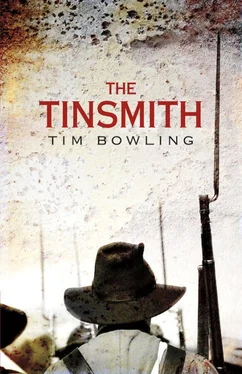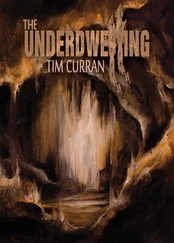Much to Anson’s surprise, Richardson did not even defend his honour. He merely sighed, his shoulders sagging.
“If I’d known about the evil,” the man said at last, “I’d not have brought her here. But she’d have come anyway. She is so good, you see, that she would risk her life to help a spirit find peace. The fever meant nothing to her.”
The young woman had a slight bump at the back of her head but was otherwise unhurt. As Anson examined her, she kept repeating, “It’s gone now. It was here, but it’s gone.” There was no longer any fear in her voice, however—just a confused kind of wonder. Anson instructed Mary Lansdowne to find suitable places of rest for the two women. Then he took Richardson aside.
“I need your assistance. Some good may yet come out of your return to this house.”
Anson briefly explained the situation that awaited in the parlour. The Southerner took the news without interest; the words hardly seemed to reach him. He was no more substantial than the long shadow he cast. But he nodded gravely once Anson had finished.
From downstairs came a mournful howling. Thomas Lansdowne’s dog, Anson supposed. Somehow the creature’s misery affected him as deeply as the human suffering around him.
“Meet me in the parlour,” he said and hurried off to get his bag.
Ten minutes later, with Thomas Lansdowne shirtless and laid out on the dining room table, Anson carefully examined the wound. It was bad, high up in the shoulder, the humerus fractured. Anson removed what bone fragments he could, all the while desperately trying to convince himself that he could avoid amputation. It had been years since he’d performed one, and he hardly trusted himself even to make the correct diagnosis, let alone to carry out the surgery. Circumstances were decidedly against him.
Thomas Lansdowne’s dog continued to howl outside, as if about to crash through the window at any moment, and the sound, along with the smell of chlorophorm, to which he was no longer so accustomed, had a powerful effect on Anson’s imagination. He kept looking at the long, thin fingers of Ambrose Richardson, pressed, upon instruction, on the subclavian artery, and seeing instead the hand of Dare, as if it had reached out of the mud-clotted darkness to help as it had done so many times before. But Anson knew his current assistant had once been his enemy on those distant battlegrounds and knew, moreover, that this same long-grieving man had endured the loss of his own left arm. The conjunction of images and memories worked against Anson’s concentration as much as the strange mixture of fatigue and exhilaration had focused it in the past. As if guided, he searched rapidly through the gore and shadows… there was something he’d seen in… what was it?… an amputation at the shoulder joint had not proved necessary because enough of the upper humerus remained intact. He asked for the light to be brought closer.
Mary Lansdowne lowered the taper over the wound. Good woman, she had recovered her senses and could now be depended upon. Anson felt encouraged. He let his thoughts remain in the past, in a barnyard open to the elements and crowded with wounded. A senior surgeon, a very experienced man who wasted no energy on saving limbs, had surprisingly saved a young soldier’s arm in just such a case as this, by…
Anson peered at the bloodied gash as if he could see through it. What was it that man had done? He had made an incision… yes… and extracted the splintered head of the humerus. If there was enough upper bone… Anson probed with his fingers. The breathing of his assistants faded into the dog’s howls, then even the howls diminished. Anson picked up his knife.
“Wipe, please,” he said.
Mary Lansdowne quickly mopped the sweat from his brow.
Anson’s hand was firm as he made the incision, firm as he removed the head of the humerus, firm as he sewed the wound shut and positioned the arm upwards, indicating to Mary Lansdowne how a sling would be required to keep the bone as high as possible. Only when Anson stepped away from the table and the lived years rushed together into the strange, living present, and the voices of the wounded were replaced with other voices at the dining room door, did his whole body go so limp that he almost lost his balance. He found a chair and gingerly lowered himself into it. His lower back ached and his hands were weak. He let his eyelids fall.
“You have carried out your duties nobly, sir,” Richardson said with unusual warmth. “I will deal with this.”
Anson opened his eyes and looked after the Southerner. An Indian couple stood in the doorway. The smell of fish blood and the river poured off them as they spoke quietly to Richardson and Mary Lansdowne. Suddenly she reeled and Richardson, with much difficulty, caught and held her in his one arm. Anson rushed forward.
The Indians’ faces were blank as they withdrew. Outside, the dog’s howls had turned to ferocious barks.
Richardson said, “They spoke a strange mix of words. I couldn’t understand much…”
“Henry’s gone after him!” Mary Lansdowne cried. “He’ll be killed!”
Richardson stared at her, then at Anson; it seemed that the idea of revenge, despite his own sorrows, had grown cold in him.
But Anson was not alarmed for Henry Lansdowne’s sake. The Englishman obviously had blood vengeance and a cool intellect on his side. He was not a man quick to act, but when he did so, he was undoubtedly dangerous. Anson realized that he had no choice.
“I entrust the patient… the patients… to your care,” he said over his shoulder as he left the room.
From the wall in Thomas Lansdowne’s den, Anson removed a shotgun and loaded it. Then he hurried to catch up to the Indians.
They had not gone far, but only the dog’s incessant barking and growling indicated their whereabouts. The darkness had closed as though sewn to the earth. To the west along the riverbank, the cannery beat remorselessly on, spewing smoke and yellow shards of light, but even its hissings and clankings seemed smothered by the thick night. A wind had come up from the east, but it wasn’t strong enough to freshen the air of its heavy blood, slime, and low tide taste.
The Indians stopped at Anson’s call. The dog, whimpering, ran to his side, as if seeking permission to return to her master. She moved heavily, her belly swollen.
“It’s all right, girl, go on now, go on back.”
Anson shouldered the gun and spoke plainly to the man.
“I need to get to Crescent Slough right away.”
The Indian’s face was noncommittal in the darkness. He spoke softly to the woman. She nodded.
“I’ll go,” he said. “But not stay.”
Anson understood. He also wasn’t keen to follow any farther in the wake of Henry Lansdowne’s vengeance than was necessary. Unfortunately, the necessity was ultimate, he could not pretend otherwise. The heavy smell of blood wafting over the damp earth was more than sobering fact; it was the unassailable truth that had replaced faith and memory. He could no more turn away from it than Henry Lansdowne could turn away from his vengeance. And it was a truth whose darkness could be penetrated only by a different belief. That Dare stood at the centre of it meant that Anson had no illusions about his journey. More than even the child’s survival, it was, at last, the reason he had come to this place—to prevent a murder. But the knowledge was like a gun at his back.
Past the wharf in the direction of the slough mouth, they neared the Indian settlement, their way dimly lit by burning bulrushes he’d been told were dipped in oolichan grease. A cluster of barking dogs ran out of the shadows but retreated immediately at the male Indian’s command. Though they moved steadily, Anson and the Indian couple’s progress seemed imperceptible. The smell of fish and tide deepened, the river sucked at its banks, the stars brightened but cast no greater light: the distance to Crescent Slough might have been the distance between planets. By the time Anson and the male Indian had veered off to the riverbank, boarded a skiff, and set off into the current, only minutes had passed, but Anson could not stop himself from thinking in years; each pull of the oars was like a tear in the thin fabric between a life’s experiences, between the child’s and the man’s sense of time. From the Indian, Anson learned little, only that Henry Lansdowne had left just before the Indian and his wife had come to the house: if he pulled hard and steadily, the Indian believed he could close the gap. Anson settled into the bow, and his body tensed, set to the trigger of Henry Lansdowne’s anger. The canoe seemed to plunge through panes of glass that broke silently again and again. Other than the almost soundless motion of the oars, only the occasional cry of a hunting owl disturbed the still air.
Читать дальше












